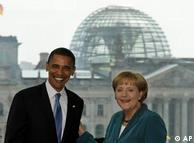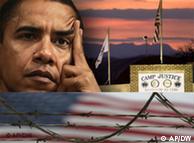United States | 27.01.2009
Obama Calls Europe, Gets Largely Cooperative Response
One week into his presidency, Barack Obama seems to be making good on his campaign pledge to adopt a more multilateral approach to global problems than his predecessor.
On Monday, Jan. 26, Obama gave his first formal television interview to the Arab-language channel Al-Arabiya, in which he sought to reassure Muslims in the Middle East that "Americans are not your enemy."
He also put in telephone calls to French President Nicolas Sarkozy, German Chancellor Angela Merkel and Russia President Dmitry Medvedev.
Obama and Sarkozy conversed for 30 minutes. Afterwards, in a statement, the French president said they have agreed to work together in "resolute fashion" on the reconstruction of Afghanistan, the global economic crisis and Obama's plan to shut down the controversial army detention center in Guantanamo Bay, Cuba.
Obama's talks with Merkel and Medvedev reportedly focused on many of the same issues.
Relations between the United States and France, Germany and Russia cooled under Obama's predecessor George W. Bush -- in part because those three countries refused to support the US-led war on Iraq.
In the realm of foreign policy, Obama concentrated much of his first week in office on the Middle East. But Monday's calls suggest that he wants to increase cooperation between the US and Europe as well.
Media Hit
 Bildunterschrift: Großansicht des Bildes mit der Bildunterschrift: Obama supports states' effort to reduce CO2 emissions
Bildunterschrift: Großansicht des Bildes mit der Bildunterschrift: Obama supports states' effort to reduce CO2 emissions
The decisions taken by Obama during his first seven days are going down well with European newspapers, most of which took a dim view of Bush and what were perceived as his short-sighted, unilateral policies.
"The diversity of the decisions and directives in the past seven days gives us an idea not only of Obama's political caliber…but also of his modus operandi: his ability to decide cleverly and maneuver between hostile ideological fronts," wrote the Italian newspaper La Repubblica.
European opinion-makers have welcomed the appointment of former Senator George Mitchell, the architect of peace in Northern Ireland, as US special envoy to the Middle East.
"Our hopes are with him and the new American government," wrote the French paper Paris-Normandie. "So that words and reason can finally silence weapons."
Europeans are also encouraged by Obama's environmental policies, which place greater emphasis on clean energy sources.
"It is truly a major event that the president of the world's most powerful nation and one of its biggest polluters definitively acknowledges the need for new and more responsible policies," wrote the French paper La Presse de la Manche.
Guantanamo and other dilemmas
 Bildunterschrift: How long will the smiles between Obama and Europe last?
Bildunterschrift: How long will the smiles between Obama and Europe last?
But while the honeymoon continues for now, there are issues on which the Obama administration and Europe do not see eye to eye.
Russia, for instance, has said it will cooperate with Washington on fighting terrorism, especially in Afghanistan, but has also stressed that it wants more understanding from the US in return.
And Merkel's conservative-led government in Germany has been noticeably less enthusiastic than France about the idea that EU countries could take in some of the prisoners released from Guantanamo.
Some European newspapers are echoing the resistance to that idea.
"Without any logic at all, the US is insisting that [detainees] be dispersed to countries that have more-or-less actively participated in the war on terror," wrote the conservative-leaning Danish paper Jyllands-Posten. "It would be more obvious to send them back to their home countries."
Moreover, some left-wing commentators are disappointed in the sort of change Obama has brought to US policies -- and in particular his stated aim to step up America's military efforts in Afghanistan.
"The first Democratic president in the modern era to be elected on an anti-war ticket is also, to the relief of neocons and the liberal belligerati, a hawk," wrote Richard Seymour in Britain's Guardian newspaper.
If Obama follows through with his plan to seek a military solution in Afghanistan, he will likely call on America's European allies to do more -- something that may not sit very well with EU leaders, who have been historically skittish about sending troops abroad.

Comments